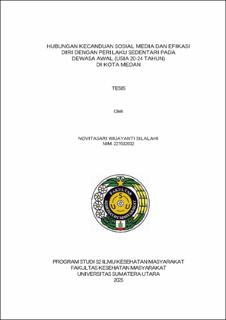| dc.description.abstract | Non-Communicable Diseases (NCDs) account for 74% of total deaths worldwide each year. There has been a shift in the pattern of NCDs, previously prevalent among older adults, now increasingly affecting younger populations. NCDs are caused by four risky lifestyle behaviors, one of which is sedentary behavior. Sedentary behavior involves activities that expend minimal energy. Several factors are associated with sedentary behavior, including technological advancements, demographic factors, and cognitive factors. One of the most time-consuming technological advancements is excessive use of social media, leading to addiction. Self-efficacy, a cognitive factor, is also associated with health behaviors. This study aims to determine the relationship between social media addiction and self-efficacy with sedentary behavior among young adults (aged 20-24 years) in Medan City. This study uses a cross-sectional design. The sampling technique employed is accidental sampling, with a total sample of 271 respondents. Data was analyzed using simple linear regression tests. The results show that 45% of respondents were aged 20 years, 87.1% were female, 90.4% were students, and 91.5% had no income. Data analysis indicates a significant positive relationship between social media addiction and sedentary behavior among young adults, with a p value (0.000) < 0.05, a correlation coefficient of 0.426, and a regression coefficient of 190.666. Additionally, there is a significant negative relationship between self-efficacy and sedentary behavior, with a p value (0.000) < 0.05, a correlation coefficient of 0.197 and a regression coefficient of -106.904. It can be concluded that higher levels of social media addiction are associated with higher sedentary behavior among young adults, while higher levels of self-efficacy are associated with lower sedentary behavior. Sedentary behavior can be reduced by using social media wisely and positively, and by enhancing self-efficacy in managing sedentary behavior. | en_US |


